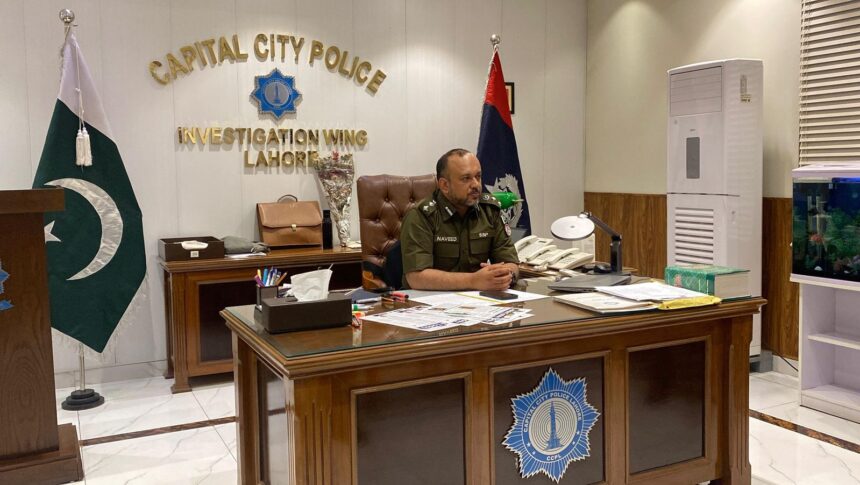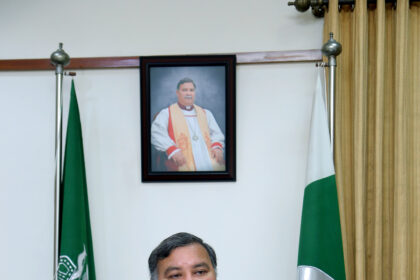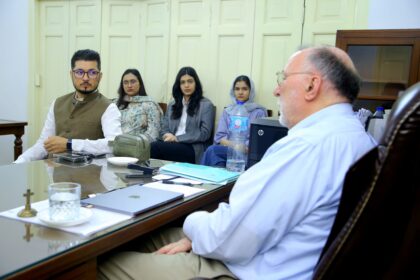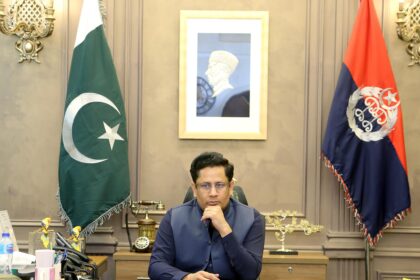JT: Thank you for speaking with Jarida Today, SSP Sahib. To begin, could you tell us a bit about your background and what drew you to the police force?
SSP Muhammad Naveed: I’m Muhammad Naveed, currently serving as SSP Investigation, Lahore. I joined the Police Service of Pakistan in 2007 after clearing the CSS exam. Before that, I spent six years in the Education Department and later also served for six years in Gilgit Baltistan. In my 16 years in the police, I’ve served as DPO in four districts. I chose this career because it allows me to deliver justice swiftly and directly to the public. Many civil disputes escalate into criminal cases, and resolving them professionally can truly impact people’s lives.
JT: With over a decade of experience, how has the police force changed—particularly in terms of technology and public interaction?
SSP Naveed: We’re living in an era of digitisation, and the Punjab Police is one of the most digitised departments in the province. FIRs, complaints, and case updates are now handled through various digital platforms. For instance, we use an app that registers over 100,000 mobile retailers. When a phone is reported stolen, its IMEI number is flagged in the system. If that phone enters the market, a pop-up alerts the police, who then recover it and return it to the rightful owner. Other tools like CRMS, E-Police Post, Pollcom, and the Police Station Environment System have also streamlined our operations.
JT: What does your daily workload typically look like? Which types of cases dominate?
SSP Naveed: We primarily deal with three categories: crimes against persons (like murder or assault), crimes against property (such as theft and robbery), and financial crimes (including fraud and forgery). We also investigate complaints against police officers themselves—such as abuse of authority or corruption. Many cases coming to my office involve requests to change the investigating officer due to dissatisfaction with the initial inquiry.
JT: Pakistan’s forensic infrastructure has often been criticised for its limitations. How does this affect investigations?
SSP Naveed: Punjab is fortunate to have the Punjab Forensic Science Agency (PFSA), a world-class facility. While other provinces face delays, we receive forensic reports within 90 days, often sooner for high-priority cases. PFSA handles ballistics, toxicology, DNA analysis, and more. It’s a critical part of how we build strong cases, particularly in crimes like murder or sexual assault.
JT: Do media or political pressures ever compromise the integrity of investigations—especially in high-profile cases?
SSP: Media acts as our eyes and ears and often provides leads we wouldn’t get otherwise. As for political pressure, Punjab has built-in checks. Investigations can be reviewed by officers at multiple levels, from ASI to DSP to SSP. If anyone is dissatisfied, they can escalate their complaint. We also regularly report to the judiciary and senior officials. The goal is always to submit evidence-based, fair investigations.
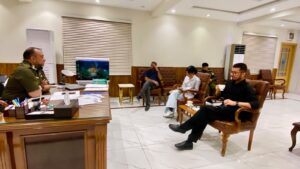
JT: What about time pressure? Do you ever feel forced to arrest suspects before a solid charge sheet is ready?
SSP Naveed: In serious crimes, prompt arrest is crucial, but we work closely with the prosecution department to ensure charge sheets are strong. We get 14 days of physical remand to investigate. If needed, we seek extensions through the court, but we do not rush to arrest without evidence. The accused’s rights and the integrity of the investigation both matter.
JT: There have been allegations of deaths in custody. How are such cases handled?
SSP Naveed: If a person dies in custody, we register an FIR against the responsible officers under the Torture and Custodial Death Act. External agencies or high-ranking officers conduct the enquiries. If found guilty, officers are dismissed and prosecuted. We do not tolerate custodial violence.
JT: Many argue that the police should not investigate themselves in such cases. Do you support external oversight?
SSP Naveed: Absolutely. Journalists frequently visit our stations and can speak with detainees. In heinous cases, joint investigation teams (JITs) are formed with members from multiple agencies. Transparency is essential, and we welcome oversight.
JT: Fake police encounters are another concern. How are these verified?
SSP Naveed: In every encounter, we call in the Punjab Forensics Agency and crime scene units. If an encounter is found to be fake, legal and departmental actions are taken. We have prosecuted and dismissed officers in such cases.
JT: And corruption—especially bribes or extortion? How do you monitor that?
SSP Naveed: We take corruption seriously. If any IO is found guilty of taking bribes, we proceed against them internally and often refer the case to the Anti-Corruption Bureau. We also hold meetings with traders and shopkeepers to ensure no “monthly” extortions occur. We receive intelligence from within the force and the public alike.
JT: Is there a culture of whistleblowing within the police?
SSP Naveed: Yes. Officers are encouraged to report misconduct. We hold regular debriefings and use intelligence channels like the “111 system”, where every officer must report information on criminal activity in their area. Officers who report wrongdoing are appreciated and protected.
JT: Finally, if you were to resign today, what would you want the public to know about police investigations?
SSP Naveed: I would urge the public to report crimes truthfully. Without their cooperation, justice is delayed. Our doors are open—people can approach me, the DPO, or any senior officer directly. Reporting crime is not just a right; it’s a civic duty.
JT: Thank you for your time, SSP Sahib. This has been incredibly insightful.
SSP Naveed: Thank you. It was a pleasure.






